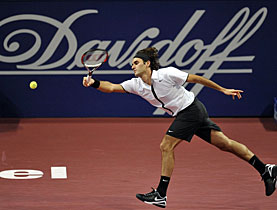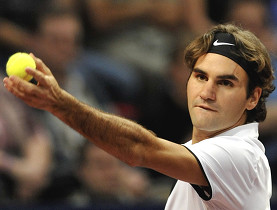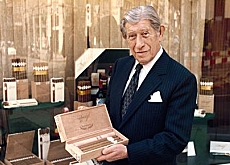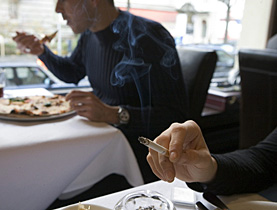Federer fires up anti-smoking emotions

As Roger Federer sets out to win his fourth consecutive Swiss Indoors title in Basel, a debate has reignited over tobacco sponsorship in sport.
The tournament, which has been sponsored by Swiss luxury brand Davidoff since 1994 and starts on Monday, is one of the last in the world to be sponsored by a tobacco company – and health campaigners aren’t happy.
“First of all, linking sport and tobacco is utterly perverse,” Jürg Hurter, president of Pro Aere, Switzerland’s largest organisation against passive smoking, told swissinfo.ch.
“Second, the tobacco industry – who aren’t idiots – try to get around tobacco promotion laws by sponsoring sporting events or by branding various products.”
Pascal Diethelm, director of the anti-smoking group OxyRomandie, said last year “players drowned in an advertising soup for Davidoff”.
“At the end of the match the young ball boys and ball girls received a medal from Roger Federer in recognition of having served the cause of Davidoff so well. Each medal bore the Davidoff logo in order to make sure that these potential smokers would know which cigarette brand to choose,” he said.
Davidoff’s cigarette brand is owned by Britain’s Imperial Tobacco, the world’s fourth-largest tobacco company.
Lasting relationship
“This discussion is like the Loch Ness monster – it comes back every year!” Jürg Vogel, a member of the Swiss Indoors organising committee, told swissinfo.ch.
“Davidoff sells not only tobacco but also perfumes and other accessories. I think you have to see the whole picture. We’re very happy to have this sponsorship – it’s one of the longest in the ATP [Association of Tennis Professionals] tour and I think it’s good for the tournament as well as for the sponsor. We hope the relationship will continue.”
Vogel denied reports that Eurosport, a satellite and cable network, had dropped the Swiss Indoors because of its connection with Davidoff.
“The Davidoff Swiss Indoors has been promoted to the new World Tour 500 Series and as a result had to give the television rights for overseas broadcasting to the ATP. That was the only reason we left Eurosport.”
Tobacco black list?
The situation has come about because while tobacco advertising has been banned in the European Union since August 2005, non-EU Switzerland leaves the decision to the country’s 26 cantons. Only one, Solothurn, has banned both tobacco advertising and sponsorship.
Nevertheless it appears unlikely that Switzerland is going to become a tobacco sponsorship paradise – a sanctuary for cigarette firms – and end up on a “tobacco black list”.
“I don’t see such a big danger, because every event has to look at its image and the image for the other partners – usually there’s more than one sponsor,” Heinz Rütter, a sports economist, told swissinfo.ch.
In Basel, title sponsor Davidoff is joined by three main sponsors and nine national sponsors.
“Also, usually the authorities are somehow involved in events – either they provide security or a stadium or they make a financial contribution – and if that’s the case, they will also want to be part of the decision-making process,” he said.
“They might do this for the image of the region but also to motivate people to do sport. Governments all around the world support sport – one reason is integration, but health is also very important.”
Health issue
But is smoking being picked on unfairly? After all, McDonald’s spends millions on sporting events, and alcohol and CO2-spouting cars appear everywhere. Indeed, on October 29 it was announced that Federer himself was joining up with Swiss chocolate maker Lindt & Sprüngli…
“It’s a very good question. Many products have negative aspects. Maybe it’s a question of measure,” Rütter said.
“With smoking, the economic impact on health is so big [SFr10 billion ($9.8 billion) a year, according to the Federal Health Office]. Society has made a big point of that – in Switzerland they’ve [voted to ban] smoking in restaurants.”
He added: “We’re going in that direction with other products: we have carbon dioxide restrictions on cars, but the connection is not so great that we try to ban them.”
Role models
So how has local lad Federer, who was once a ball boy at the Swiss Indoors, ended up in the anti-smoking crosshairs?
Two years ago OxyRomandie sent an open letter to the world number one – signed by more than 500 international health experts – calling on him to either pull out of the tournament or ask that the organisers to cut all ties with Davidoff and the tobacco industry. He declined to respond.
So should top players such as Federer – who incidentally also supports Cool and Clean, a government-backed programme to keep tobacco, alcohol and cannabis out of sport – boycott the tournament?
“I’d naturally be very happy if Federer said ‘I’m not going to take part in a Davidoff tournament – nor in any other sponsored by a deadly industry’,” said Hurter at Pro Aere.
“I can’t second-guess the thoughts of Federer, who’s a nice chap. I’m simply not happy that a deadly product is allowed to sponsor a sporting event – and is even in the title.”
Thomas Stephens, swissinfo.ch
29 per cent of the Swiss population aged 14-65 smoke. The proportion of smokers is highest among those aged 20-24.
About 8,300 people die from tobacco consumption in Switzerland annually.
There are around 16,000 cases of disability attributable to smoking.
The consumption of tobacco costs the Swiss economy SFr10 billion a year (SFr1.2 billion on medical treatment, SFr3.8 billion on invalidity costs, loss of quality of life is estimated at SFr5 billion). Income from tax on tobacco amounts to just over SFr2 billion a year.
(source: Federal Health Office’s National Programme Tobacco 2008-2012)
Tobacco advertising has been banned on Swiss radio and television since 1964. It is legal in cinemas (after 7pm) and in print media.
The issue of banning tobacco advertising which is visible in public areas, such as on billboards (even when the poster itself is on private property), is left to the cantons. Geneva banned tobacco posters in 2000 and the federal court upheld the decision in 2002.
Otherwise, tobacco sponsorship of cultural and sporting events is legal.
In 2005, the tobacco industry spent SFr49.7 million on advertising in Switzerland. Of this, 72% was spent on posters, 13% cinema, 9% magazines, 5% newspapers.
(source: Federal Health Office)

In compliance with the JTI standards
More: SWI swissinfo.ch certified by the Journalism Trust Initiative










You can find an overview of ongoing debates with our journalists here . Please join us!
If you want to start a conversation about a topic raised in this article or want to report factual errors, email us at english@swissinfo.ch.